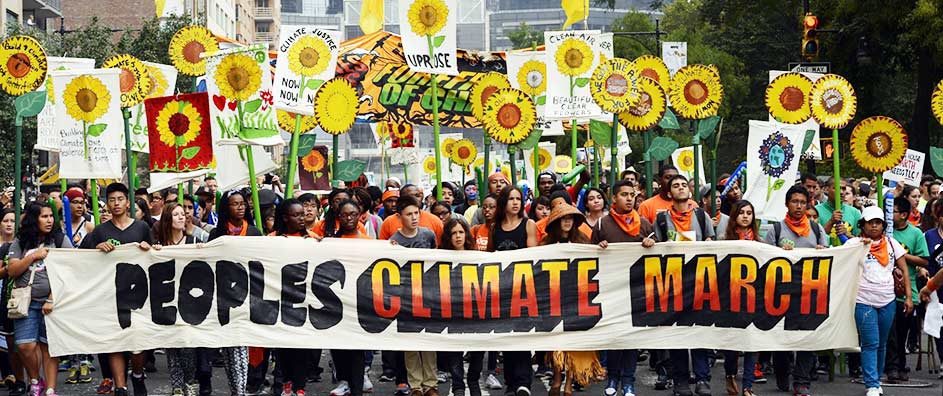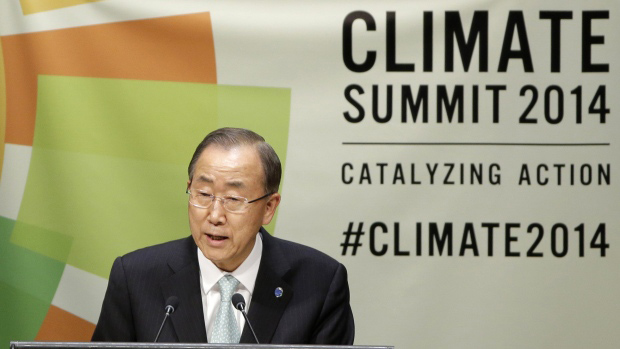The views expressed in our content reflect individual perspectives and do not represent the authoritative views of the Baha'i Faith.
It is our conviction that any call to global action for environment and development must be rooted in universally accepted values and principles. Similarly, the search for solutions to the world’s grave environmental and developmental problems must go beyond technical-utilitarian proposals and address the underlying causes of the crisis. Genuine solutions, in the Baha’i view, will require a globally accepted vision for the future, based on unity and willing cooperation among the nations, races, creeds, and classes of the human family. – The Earth Charter, The Baha’i International Community, 6 June 1992.
Get ready. This year—2015—the world will witness an unprecedented level of international activism to combat climate change. You’ll hear a great deal about climate change this year.
Much of the discussion will focus on Paris. In Paris, France this coming December, the United Nations will hold its most important Climate Change Conference to date. There the world’s nations will attempt to reach and sign a first-ever binding global treaty on the universal regulation of carbon emissions. That agreement—if we can agree–will set the “carbon budget,” the fossil-fuel pollution and greenhouse gas standards that determine how humanity addresses our quickly-mounting climate crisis.
National governments across the world will take part in the Paris conference; and their decisions will all occur amid the colliding interests of energy, economy and the environment. Enormously powerful commercial concerns like the international oil, coal and natural gas industries will attempt to influence the outcome. Political pressures will exert themselves, especially in the developing nations and those who still fear their economies might suffer if more stringent environmental measures become law. The outspoken leaders of many environmental groups will warn policy-makers, saying that half-measures and timidity will only lead us to catastrophic consequences. Faith leaders and indigenous communities will ask the world’s politicians and monarchs to consider the future of the human race and have the moral fortitude to respect creation. Religious authorities like the Pope will issue statements, principles and encyclicals on our spiritual duty to protect the natural world.
All this will happen in 2015 because the world has never faced a planetary environmental crisis like climate change. The magnitude, rapidity and potential dangers of significantly and irrevocably altering the Earth’s climate should deeply frighten all seven billion of us. Such a major alteration in our environment, scientists predict, will create global havoc. Crop failure, starvation, mass extinction of species, enormous refugee crises, the inundation of coastal communities, increasingly catastrophic weather events, more wars over oil and a tremendous worldwide economic collapse represent just a few of the probable scenarios scientists and researchers have foreseen.
But these policy-related matters won’t be the only items on humanity’s plate this year.
This universal problem will challenge every one of us now alive on planet Earth. From a Baha’i perspective, what does that mean? It means we not only have a climate change crisis—we also have a global crisis of caring.
The Baha’i teachings say that each person must now grow and extend his or her care and empathy further than it has ever gone before–and actively begin caring for and about a vastly-enlarged group of human beings. Just caring about ourselves, our families or our communities, as most of us have done in the past, will no longer suffice. The patriotism of caring for our respective nations doesn’t extend far enough, either. Caring for only those of our own race or religion definitely won’t have sufficient impact. To get us through this enormous crisis, these narrow former definitions of empathy and caring must grow and expand to encircle and embrace every member of our species and the planet we live on:
Blessed and happy is he that ariseth to promote the best interests of the peoples and kindreds of the earth… It is not for him to pride himself who loveth his own country, but rather for him who loveth the whole world. The earth is but one country, and mankind its citizens. – Baha’u’llah, Gleanings from the Writings of Baha’u’llah, p. 249.
If the learned and wise men of goodwill were to impart guidance unto the people, the whole earth would be regarded as one country. Verily this is the undoubted truth. This servant appealeth to every diligent and enterprising soul to exert his utmost endeavour and arise to rehabilitate the conditions in all regions… – Baha’u’llah, Tablets of Baha’u’llah, p. 172.
Our empathy and concern for others, and for the entire human race, has to grow wider and more universal than ever before. We need to find a way, each of us, to love the whole world and all its people.
The climate change crisis means caring for the entire planet and everyone on it, becoming aware of the needs of the globe and all its inhabitants, rehabilitating the conditions in all regions and not just our own, with universal loyalty as our highest aim and desire. As a species, we stand now at a definitive moment, a time historians will undoubtedly look back on and characterize as one of the major pivotal points of history. We face a stark, basic choice—stay at the current adolescent stage of our collective human spiritual development, and allow its fragmented, violent and materialistic cultural forces to create enormous, permanent damage and injustice; or consciously decide to leave our adolescence behind and grow into a truly global civilization, assuming the kind, loving and peaceful responsibilities of our shared spiritual adulthood and our essential oneness.
This huge task will require the love, the caring and effort of all seven billion of us.

















Comments
Sign in or create an account
Continue with Googleor